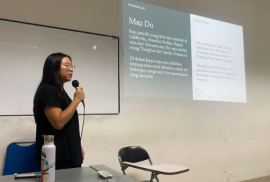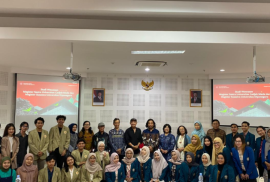Yogyakarta, 22 November 2025 — The Faculty of Cultural Sciences (FIB) of Universitas Gadjah Mada has once again achieved an impressive accomplishment at a national-level entrepreneurship event. In the competition organized by the Directorate of Learning and Student Affairs of the Ministry of Higher Education, Science, and Technology (Kemendiktisaintek), the FIB Mandira Heritage Team secured 1st Place in the Growing Business Category at the 2025 KMI Expo, the culminating event of the Indonesian Student Entrepreneurship Program (KMI).
This event brought together young entrepreneurs from universities across Indonesia in a collaborative atmosphere that encouraged innovation and sustainability. Mandira Heritage Group stood out with its ideas that combine cultural themes, creativity, and digital technology. Products such as Mandira Brick, Mandira Puzzle with Augmented Reality technology, Bimba Brush, and JAKI, an interactive 3D puzzle, captivated both visitors and judges. Strong product design, compelling visual creativity, and rich cultural narratives made UGM’s booth one of the most striking among the participants.
This achievement was made possible through the guidance of Fahmi Prihantoro, M.A., a lecturer from the Department of Archaeology, who supported the team from concept development to final execution. The accomplishment further strengthens FIB UGM’s position as a faculty that not only focuses on humanities studies but also encourages students to innovate within the cultural-based creative industry.
Mandira Heritage’s success aligns with the spirit of the Sustainable Development Goals (SDGs), particularly the commitment to advancing quality education and strengthening culture-based creative economies. Through the use of digital technology in cultural preservation and education, this initiative supports the creation of inclusive and innovative learning experiences. Additionally, participation in a collaborative event that brings together universities nationwide reflects efforts to reinforce national partnerships as part of sustainable development.
[Public Relations of FIB UGM, Alma Syahwalani]







